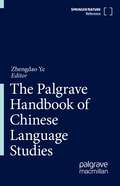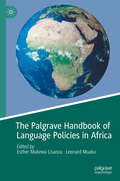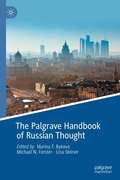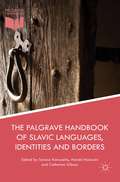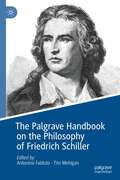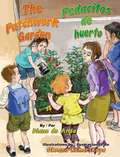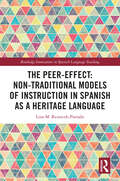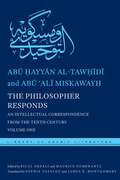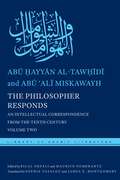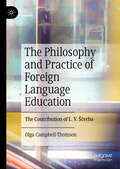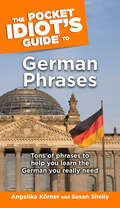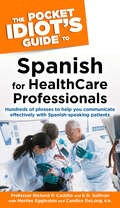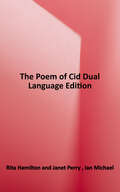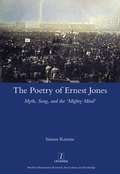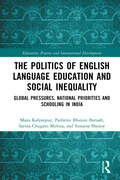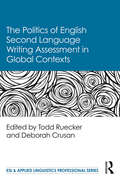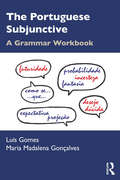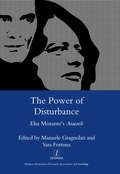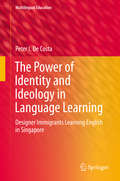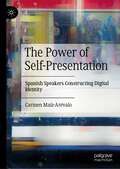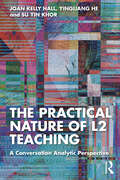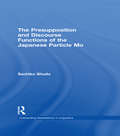- Table View
- List View
The Palgrave Handbook of Chinese Language Studies
by Zhengdao YeThis new major reference work provides a comprehensive overview of linguistic phenomena in a variety of Sinitic languages in a global context, highlighting the dynamic interaction between these languages and English. This “living reference work” offers a window into the linguistic sphere in China and beyond, and showcases the latest research into diverse and evolving linguistic phenomena that have resulted from intensified interactions between the Sinophone world and other lingua-spheres. The Handbook is divided into five sections. The chapters in Section I (New Research Trends in Chinese Linguistic Research) present fast-growing research areas in Chinese linguistics, particularly those undertaken by scholars based in China. Section II (Interactions of Sinitic Languages) focuses on language-contact situations inside and outside China. The chapters in Section III (Meaning, Culture, Translation) explore the meanings of key cultural concepts, and how ideas move between Chinese and English through translation across various genres. Section IV (New Trends in Teaching Chinese as a Foreign Language) covers new ideas and practices relating to teaching the Chinese language and culture. The final section, Section V (Transference from Chinese to English), explores dynamic interactions between varieties of Chinese and varieties of English, as they play out in multilingual sites and settings
The Palgrave Handbook of Language Policies in Africa
by Esther Mukewa Lisanza Leonard MuakaThis handbook explores language policies and their impacts in Africa, examining the different language policies in each country from pre-colonial to post-colonial times. Most African countries are multilingual, apart from a handful which are said to be quasi-monolingual. The authors in this handbook investigate language policy in education, media, legal courts, government documents and other public domains, and show how these policies shape learning and delivery of services to the citizens. The volume also pays special attention to the roles assigned to minority languages in Africa, most of which are endangered. The contributions also investigate how these language policies are influenced by the history of colonialism and language attitudes emanating from colonial rule. This handbook will be of interest to a diverse audience of readers, including those interested in African languages, language planning and policy, and African history and education.
The Palgrave Handbook of Russian Thought
by Michael N. Forster Lina Steiner Marina F. BykovaThis volume is a comprehensive Handbook of Russian thought that provides an in-depth survey of major figures, currents, and developments in Russian intellectual history, spanning the period from the late eighteenth century to the late twentieth century. Written by a group of distinguished scholars as well as some younger ones from Russia, Europe, the United States, and Canada, this Handbook reconstructs a vibrant picture of the intellectual and cultural life in Russia and the Soviet Union during the most buoyant period in the country's history. Contrary to the widespread view of Russian modernity as a product of intellectual borrowing and imitation, the essays collected in this volume reveal the creative spirit of Russian thought, which produced a range of original philosophical and social ideas, as well as great literature, art, and criticism. While rejecting reductive interpretations, the Handbook employs a unifying approach to its subject matter, presenting Russian thought in the context of the country's changing historical landscape. This Handbook will open up a new intellectual world to many readers and provide a secure base for its further exploration.
The Palgrave Handbook of Slavic Languages, Identities and Borders
by Tomasz Kamusella Motoki Nomachi Catherine GibsonThis book analyzes the creation of languages across the Slavophone areas of the world and their deployment for political projects and identity building, mainly after 1989. It offers perspectives from a number of disciplines such as sociolinguistics, socio-political history and language policy.Languages are artefacts of culture, meaning they are created by people. They are often used for identity building and maintenance, but in Central and Eastern Europe they became the basis of nation building and national statehood maintenance. The recent split of the Serbo-Croatian language in the wake of the break-up of Yugoslavia amply illustrates the highly politicized role of languages in this region, which is also home to most of the world’s Slavic-speakers. This volume presents and analyzes the creation of languages across the Slavophone areas of the world and their deployment for political projects and identity building, mainly after 1989. The overview concludes with a reflection on the recent rise of Slavophone speech communities in Western Europe and Israel. The book brings together renowned international scholars who offer a variety of perspectives from a number of disciplines and sub-fields such as sociolinguistics, socio-political history and language policy, making this book of great interest to historians, sociologists, political scientists and anthropologists interested in Central and Eastern Europe and Slavic Studies.
The Palgrave Handbook on the Philosophy of Friedrich Schiller
by Antonino Falduto Tim MehiganFriedrich Schiller is justly celebrated for his dramas and poetry. Yet, above all, he was a polymath, whose writings enriched a range of fields including history and philosophy. Until now, no comprehensive accounting of this philosophy has been undertaken. The Palgrave Handbook on the Philosophy of Friedrich Schiller makes good this desideratum, treating Schiller's poetry, prose, and dramatic work alongside his philosophical writings and reviewing his thought not only in connection with those who influenced him, such as Kant, Reinhold, and Fichte, but also those he anticipated, such as Hegel, Marx, and the Neo-Kantians. Topics treated in this volume include Schiller's philosophical background, his theoretical writings, Schiller's philosophical writing in light of his entire oeuvre, and Schiller's philosophical legacy. The Handbook also includes an overview of the main topics Schiller addressed in his philosophical writings including philosophical anthropology, aesthetics, moral philosophy, politics and political theory, the philosophy of history, and the philosophy of education. Bringing together the latest research on Schiller and his thought by leading scholars in the field, the Handbook draws attention to Schiller's undiminished importance for philosophical debates today.
The Patchwork Garden / Pedacitos de huerto (Into Reading, Read Aloud Module 8 #3)
by Oksana Kemarskaya Diane AndaNIMAC-sourced textbook <p><p> Tonia loves to listen to her Abuela's stories about when she was a young girl. When her grandmother remembers planting a vegetable garden "on my own little square patch of land," Tonia wishes she too could have her very own garden. Their apartment building is surrounded by cement, but Abuela reminds her that it only takes a small patch of land to grow tomatoes or squash and even carrots. And soon, they have a plan! <p> First, they speak to Father Anselmo about a weed-filled lot behind the church. He likes the idea of beautiful green plants instead of weeds, and fresh vegetables sound delicious too! With help from her family, Tonia yanks out the weeds and plants rows of vegetables. Each day after school, she and Abuela water the seedlings and pull out weeds that have sneaked in between the plants. In a few weeks, "the garden was green with lacy carrot tops in a row, vines of squash curling on the ground and bushy green tomato plants." <p> Tonia loves the garden, but feels sad for all the children who walk by and wish they had a garden of their very own, too. Then her grandmother's quilt gives Tonia an idea. Together they find little plots of land all around the neighborhood for the other children, and soon the community is full of small garden patches that remind Tonia of Abuela's patchwork quilt. <p> With brightly hued illustrations that depict a cityscape full of multiple generations working towards a common goal, children ages 7-10 will be inspired to plant and perhaps even eat!-their own vegetables after reading this charming bilingual picture book.
The Peer-Effect: Non-Traditional Models of Instruction in Spanish as a Heritage Language (Routledge Innovations in Spanish Language Teaching)
by Lina M. Reznicek-ParradoThe Peer Effect: Non-Traditional Models of Instruction in Spanish as a Heritage Language guides an important pedagogical conversation on the relevance of heritage language and literacy practices as resources for instruction, framing heritage teaching and learning as a social justice issue. Presenting ethnographic and discourse analyses of a heritage peer tutoring program at a university in California, this book focuses on the ways in which the dynamic translanguaging practices that Spanish heritage language (SHL) peer tutors mobilize in a non-classroom, student-led, collaborative academic space directly respond to the literacy demands of academic language development. Based on the in-depth analysis of peer tutors’ translingual practices, the book advances scholarship in SHL pedagogy, providing concrete classroom-based examples, techniques, and activities that nurture equitable pedagogies for heritage student belonging, while challenging the deficit discourse that has traditionally governed the dialogue around literacy instruction for multilingual students. This versatile volume is designed for educators, researchers, practitioners, and students in the fields of heritage language pedagogy, bilingual education, educational linguistics, and literacy studies for multilingual students.
The Pet Vet
by Marcia LeonardI am Bret. I am a vet. I can help you with your pet. Is your tan cat sick and hot? I will fix it with a shot.
The Philosopher Responds: An Intellectual Correspondence from the Tenth Century, Volume One (Library of Arabic Literature #19)
by Abū Ḥayyān al-Tawḥīdī Abū ʿAlī MiskawayhQuestions and answers from two great philosophersWhy is laughter contagious? Why do mountains exist? Why do we long for the past, even if it is scarred by suffering? Spanning a vast array of subjects that range from the philosophical to the theological, from the philological to the scientific, The Philosopher Responds is the record of a set of questions put by the litterateur Abu Hayyan al-Tawhidi to the philosopher and historian Abu 'Ali Miskawayh. Both figures were foremost contributors to the remarkable flowering of cultural and intellectual life that took place in the Islamic world during the reign of the Buyid dynasty in the fourth/tenth century. The correspondence between al-Tawhidi and Miskawayh holds a mirror to many of the debates and preoccupations of the time and reflects the spirit of rationalistic inquiry that animated their era. It also provides insight into the intellectual outlooks of two thinkers who were divided as much by their distinctive temperaments as by the very different trajectories of their professional careers. Alternately whimsical and tragic, wondering and brooding, trivial and profound, al-Tawhidi’s questions provoke an interaction as interesting in its spiritedness as in its content. This new edition of The Philosopher Responds is accompanied by the first full-length English translation of this important text, bringing this interaction to life for the English reader.A bilingual Arabic-English edition.
The Philosopher Responds: An Intellectual Correspondence from the Tenth Century, Volume Two (Library of Arabic Literature #24)
by Abū Ḥayyān al-Tawḥīdī Abū ʿAlī MiskawayhQuestions and answers from two great philosophersWhy is laughter contagious? Why do mountains exist? Why do we long for the past, even if it is scarred by suffering? Spanning a vast array of subjects that range from the philosophical to the theological, from the philological to the scientific, The Philosopher Responds is the record of a set of questions put by the litterateur Abu Hayyan al-Tawhidi to the philosopher and historian Abu 'Ali Miskawayh. Both figures were foremost contributors to the remarkable flowering of cultural and intellectual life that took place in the Islamic world during the reign of the Buyid dynasty in the fourth/tenth century. The correspondence between al-Tawhidi and Miskawayh holds a mirror to many of the debates and preoccupations of the time and reflects the spirit of rationalistic inquiry that animated their era. It also provides insight into the intellectual outlooks of two thinkers who were divided as much by their distinctive temperaments as by the very different trajectories of their professional careers. Alternately whimsical and tragic, wondering and brooding, trivial and profound, al-Tawhidi’s questions provoke an interaction as interesting in its spiritedness as in its content. This new edition of The Philosopher Responds is accompanied by the first full-length English translation of this important text, bringing this interaction to life for the English reader.A bilingual Arabic-English edition.
The Philosophy and Practice of Foreign Language Education: The Contribution of L. V. Ščerba
by Olga Campbell-ThomsonThis volume brings the writings of Russian linguist Lev Vladimirovič Ščerba (1880–1944) to English-language readers for the first time. The collection includes key essays in which Ščerba addresses the issues of educational methodology for foreign languages, contextualised with a critical introduction and commentary, as well as an extensive bibliography of further reading. In the historical context of linguistic scholarship, Ščerba’s work is closely interlinked with major developments in the field of modern language studies in Western Europe at the turn of the twentieth century as well as with the Russian educational tradition. By studying Ščerba’s writing, it is possible to trace the foundational linguistic impetus for the development of this field of scholarship, as well as educational concerns that have since been integrated in the programme of modern language studies. The ideas advanced in Ščerba’s texts remain directly relevant today to policy-makers, teacher trainers, methodologists, and foreign language practitioners. They should be of particular interest to readers in Anglophone countries where foreign languages remain on the periphery of all levels of education. This book will enable English language readers to engage in their own critical reflection on Ščerba’s texts.
The Pocket Idiot's Guide to German Phrases: Tons of Phrases to Help You Learn the German You Really Need
by Susan Shelly Angelika KornerSprechen Sie Deutsch? You do now! The Pocket Idiot&’s Guide® to German Phrases is a handy, informative, and fun guide to all the phrases readers need to enjoy a visit to Germany, complete with the basics of German grammar and syntax and a compact German-English/English-German dictionary. • Nearly 1.7 million Americans travel to Germany each year for business and/or leisure—and most will find this book invaluable. • Full of current and classic phrases from every aspect of life and travel, along with useful travel tips and maps. • Easy-to-use pronunciation guide and verb, noun, and idiom charts. • Convenient, pocket-size format for on-the-go travelers.
The Pocket Idiot's Guide to Spanish For Health Care Professionals
by K.D. Sullivan Prof. Richard P. CastilloFor health workers serving a growing community. Today, when one in four babies born in the US is Hispanic, it is essential that every hospital administrator, nurse, EMT, and doctor have a working knowledge of Spanish. Chapters include vocabulary, phrases, and pronunciation for everything from insurance forms to mental health to prenatal care, with additional sections on dentistry and optometry. • Essential reference for doctors, nurses, EMTs, nursing home staff, home caregivers, volunteers, hospice nurses, and administrators. • Perfect size for a lab coat pocket. • Author is an experienced linguist with experience in teaching health care–related Spanish courses.
The Pocket Idiot's Guide to Spanish for Law Enforcement Professionals
by Lt. Jacquelyn R. MacConnellCommunicate with ease with the Spanish-speaking public!Learning Spanish is vital to performing many public services, include police work and other law-enforcement professions. Police, patrollers, detectives, and corrections, parole, court, and security officers who interact with Spanish-speaking people need this specialized, easy-to-use guide to help them communicate and sometimes translate quickly and effectively—anywhere.• From expert authors with experience in Spanish language instruction for law enforcement officials.• Essential phrases—including Miranda rights—and vocabulary for patrol, investigations, emergency situations, narcotics, corrections, and more.• Easy-to-use phonetic translations.• Useful information on Latino culture and street Spanish.
The Poem of the Cid
by Janet Perry Rita HamiltonOne of the finest epic poems, and the only one to have survived from medieval Spain, The Poem of the Cid recounts the adventures of the warlord and nobleman Rodrigo Diaz de Vivar - 'Mio Cid'. A forceful combination of heroic fiction and historical fact, the tale seethes with the restless, adventurous spirit of Castille, telling of the Cid's unjust banishment from the court of King Alfonso, his victorious campaigns in Valencia, and the crowning of his daughters as queens of Aragon and Navarre - the high point of his career as a warmonger. An epic that sings of universal human values, this is one of the greatest of all works of Spanish literature.
The Poetry of Ernest Jones Myth, Song, and the ‘Mighty Mind’: Myth, Song, And The 'mighty Mind (Legenda Ser.)
by Simon RennieAs the last leader of the Chartist movement, Ernest Charles Jones (1819-69) is a significant historical figure, but he is just as well-known for his political verse. His prison-composed epic The New World lays claim to being the first poetic exploration of Marxist historical materialism, and his caustic short lyric ‘The Song of the Low’ appears in most modern anthologies of Victorian poetry. Despite the prominence of Jones’s verse in Labour history circles, and several major inclusions in critical discussions of working-class Victorian literature, this volume represents the first full-length study of his poetry. Through close analysis and careful contextualization, this work traces Jones’s poetic development from his early German and British Romantic influences through his radicalization, imprisonment, and years of leadership. The poetry of this complex and controversial figure is here fully mapped for the first time.
The Politics of English Language Education and Social Inequality: Global Pressures, National Priorities and Schooling in India (Education, Poverty and International Development)
by Maya Kalyanpur Padmini Bhuyan Boruah Sarina Chugani Molina Sunaina ShenoyBased on policy analysis and empirical data, this book examines the problematic consequences of colonial legacies of language policies and English language education in the multilingual contexts of the Global South. Using a postcolonial lens, the volume explores the raciolinguistics of language hierarchies that results in students from low-income backgrounds losing their mother tongues without acquiring academic fluency in English. Using findings from five major research projects, the book analyzes the specific context of India, where ambiguous language policies have led to uneasy tensions between the colonial language of English, national and state languages, and students’ linguistic diversity is mistaken for cognitive deficits when English is the medium of instruction in schools. The authors situate their own professional and personal experiences in their efforts at dismantling postcolonial structures through reflective practice as teacher educators, and present solutions of decolonial resistance to linguistic hierarchies that include critical pedagogical alternatives to bilingual education and opportunities for increased teacher agency. Ultimately, this timely volume will appeal to researchers, scholars, academics, and students in the fields of international and comparative education, English and literacy studies, and language arts more broadly. Those interested in English language learning in low-income countries specifically will also find this book to be of benefit to their research.
The Politics of English Second Language Writing Assessment in Global Contexts (ESL & Applied Linguistics Professional Series)
by Todd Ruecker Deborah CrusanReflecting the internationalization of the field of second language writing, this book focuses on political aspects and pedagogical issues of writing instruction and testing in a global context. High-stakes assessment impacts the lives of second language (L2) writers and their teachers around the world, be it the College English Test in China, Common Core-aligned assessments in the U.S., English proficiency tests in Poland, or the material conditions (such as access to technology, training, and other resources) affecting a classroom. With contributions from authors working in ten different countries in a variety of institutional contexts, the chapters examine the uses and abuses of various writing-related assessments, and the policies that determine their form and use. Representing a diverse range of contexts, methods, and disciplines, the authors jointly call for more equitable testing systems that consider the socioeconomic, psychometric, affective, institutional, and needs of all students who strive to gain access to education and employment opportunities related to English language proficiency.
The Portuguese Subjunctive: A Grammar Workbook
by Luís Gomes Maria Madalena GonçalvesThe Portuguese Subjunctive: A Grammar Workbook is the first book devoted exclusively to understanding and mastering this challenging area of Portuguese grammar. The clear structure guides students through the six subjunctive tenses, providing them with concise and accurate explanations accompanied by a range of exercises to test and consolidate learning. Each chapter is designed to help students progress from simple to more complex use of the language, with instructions initially set in English before moving to Portuguese, and exercises progressing from simple application to more advanced translation and 'compare and contrast' tasks. This grammar workbook is ideal for intermediate to advanced learners of European or Brazilian Portuguese who wish to master the use of the subjunctive. It can be used as a supplementary in-class text as well as a resource for independent study.
The Power of Disturbance: Elsa Morante's "Aracoeli"
by Sara FortunaAracoeli (1982) was the last novel written by Elsa Morante (1912-85), one of the most significant Italian writers of the twentieth century. The journey, both geographical and memorial, of a homosexual son in search of his dead mother is a first-person narrative that has puzzled many critics for its darkness and despair. By combining scholars from different disciplines and cultural traditions, this volume re-evaluates the esthetical and theoretical complexity of Morante's novel and argues that it engages with crucial philosophical and epistemological questions in an original and profound way. Contributors explore the manifold tensions staged by the novel in connection with contemporary philosophical discourse (from feminist/queer to political theory to psycho-analysis) and authors (such as Emilio Gadda, Pier Paolo Pasolini and Pedro Almodovar). The Power of Disturbance shows that by creating a 'hallucinatory' representation of the relationship between mother and child, Aracoeli questions the classical distinction between subject and object, and proposes an altogether new and subversive kind of writing. Manuele Gragnolati teaches Italian literature at Oxford University, where he is a Fellow of Somerville College. Sara Fortuna teaches philosophy of language at the Universita Guglielmo Marconi in Rome.
The Power of Identity and Ideology in Language Learning
by Peter I. De CostaThis critical ethnographic school-based case study offers insights onthe interaction between ideology and the identity development of individualEnglish language learners in Singapore. Illustrated by case studies of thelanguage learning experiences of five Asian immigrant students in anEnglish-medium school in Singapore, the author examines how the immigrantstudents negotiated a standard English ideology and their discursivepositioning over the course of the school year. Specifically, the study traceshow the prevailing standard English ideology interacted in highly complex wayswith their being positioned as high academic achievers to ultimately influencetheir learning of English. This potent combination of language ideologies andcirculating ideologies created a designer student immigration complex. Byframing this situation as a complex, the study problematizes the power of ideologiesin shaping the trajectories and identities of language learners.
The Power of Oratory in the Medieval Muslim World
by Linda G. JonesOratory and sermons had a fixed place in the religious and civic rituals of pre-modern Muslim societies and were indispensible for transmitting religious knowledge, legitimizing or challenging rulers, and inculcating the moral values associated with being part of the Muslim community. While there has been abundant scholarship on medieval Christian and Jewish preaching, Linda G. Jones's book is the first to consider the significance of the tradition of pulpit oratory in the medieval Islamic world. Traversing Iberia and North Africa from the twelfth to the fifteenth centuries, the book analyzes the power of oratory, the ritual juridical and rhetorical features of pre-modern sermons, and the social profiles of the preachers and orators who delivered them. The biographical and historical sources, which form the basis of this remarkable study, offer abundant proof of cultural exchange between al-Andalus and the eastern regions of the Islamic empires, as preachers traveled back and forth between the great cities of Cordoba, Qayrawan, Baghdad, and Cairo. In this way, the book sheds light on different regional practices and the juridical debates between individual preachers around correct performance.
The Power of Self-Presentation: Spanish Speakers Constructing Digital Identity
by Carmen Maíz-ArévaloThis book follows a Goffmanian approach to self-presentation to focus on the different strategies Spanish users employ to construct their digital identity in profiles, biographies, pictures, and statuses on platforms such WhatsApp, Twitter, Facebook, Instagram and LinkedIn. The author presents a functioning taxonomy of self-presentation strategies along the front-stage/back-stage continuum, including common strategies such as eudaimonic (or inspirational) messages and the use of humour. Special attention is paid to the effects of social variables such as the users' gender and age, and the perceived purposes of the different platforms (e.g. LinkedIn is often intended as a professional market for job hunting, whereas Facebook is rarely used in this context). The book will be of interest to students and scholars of Technologically Mediated Communication (traditionally known as Computer-Mediated Communication or CMC), media communication, internet pragmatics, digital discourse analysis, and related fields.
The Practical Nature of L2 Teaching: A Conversation Analytic Perspective
by Joan Kelly Hall Yingliang He Su Yin KhorDrawing on video recordings and transcripts from a wide range of L2 teaching contexts, The Practical Nature of L2 Teaching presents a comprehensive examination of eight sets of specialized actions and action sequences involved in whole group instruction. Each of the chapters highlights in exquisite detail the sophisticated, real-world accomplishment of L2 teaching. The purpose is not to impose a vision of how L2 teaching should be done. Instead, it is to illuminate its complexities and, in so doing, reveal informative differences between idealized understandings of L2 teaching and its lived realities. The book is essential reading for advanced undergraduates, graduate students, and researchers studying and working in the areas of classroom interaction, L2 teaching, and L2 teacher education.
The Presupposition and Discourse Functions of the Japanese Particle Mo (Outstanding Dissertations in Linguistics)
by Sachiko ShudoFirst Published in 2002. Routledge is an imprint of Taylor & Francis, an informa company.
